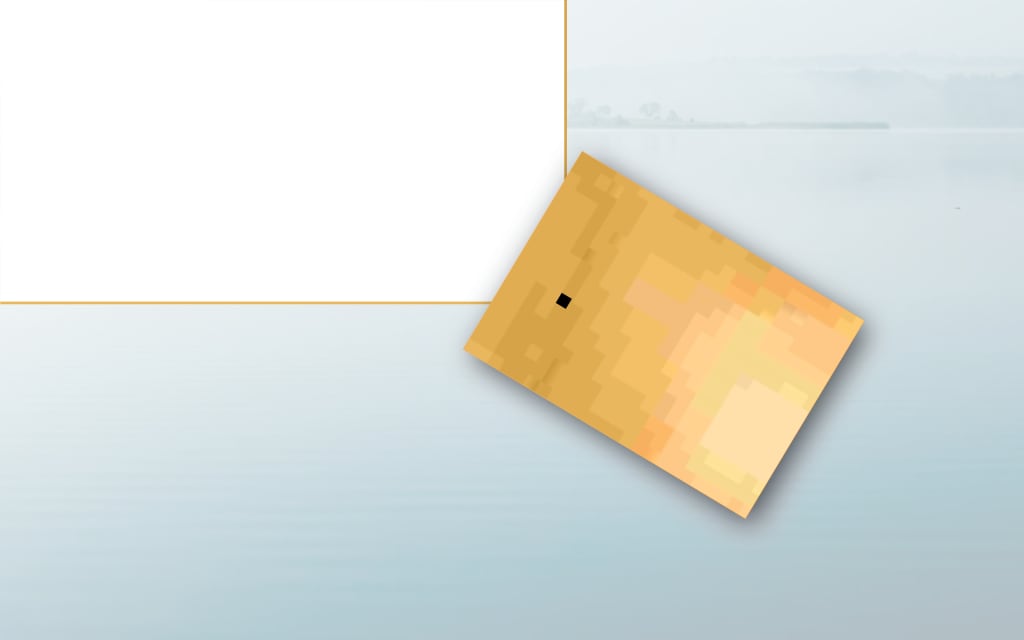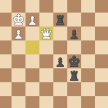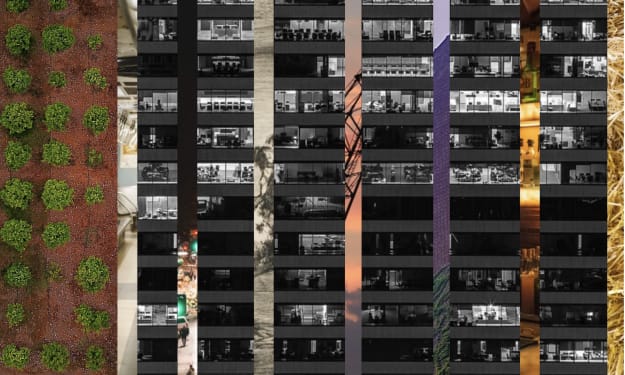
After swallowing it he continued to squint at her pixelated neckline, looking for blemishes and wondering if he would outlast the old laptop. Wasn’t there something almost cunning to her curation—the pictures all felt deeply serendipitous even though he knew none of them were. The strangest thing hadn’t been the realization itself, that any ritual of closure should reflect not the heights but the median of his spent time, his daydreamed scrolling, but the clarity with which he’d remembered the laptop and hard drive that morning, and known only then precisely what he would be doing during this period of twenty minutes approximately.
Her oeuvre was largely tasteful but luckily he’d kept a few of her swimming, smiling. She had one of those faux-academic chemical tattoos on her back—the hexagonal formula for something considered and then displayed as fundamental. Dextroamphetamine, maybe, ball-parking the inspiration as confessional over recreational—a brand name SSRI or something. He imagined her tattoo artist as a graphic designer by day, doling out ink passionately only after a morning spent repurposing digital assets into garish infographics printed neatly on the cases that arrived driverless several years later to instruct those remaining—some of them tattooed, still, as it were—to the lethality and time-release of their contents. Wrapped in that awful clamshell plastic, fucking impossible without scissors. Enough to make a guy wonder if there were something more proper to cutting out the G-man and using the scissors instead, if there were designated social hashtags assigned to colorless crystalline salt that dissolved in stomach acid before dissolving trace uncertainty.
The architects of the solution, if it could be called that, did not seem to have considered such moralistic critiques. A situation had been articulated to or by them as time-sensitive, a puzzle of logistics, and because they had chosen or been directed to concern themselves with good old-fashioned supply and demand, that was the problem that had been solved, and a week ago on the trucks there had been four doses per person left to figure out for themselves whether to take a single one, scurry off home to make preparations, or not. If the photos’ absence of effort had stuck out to him years ago, so too had their composite fear of imperfection, of life as it was under the surfaces of self-performance, digital static, mascara. He’d magnified the pool shot utterly, and was still panning past chess boards of pixel paint swatches when he paused across a black square surrounded by gold on all sides.
Khaki military trucks had arrived driverless. So why did it seem like it was in the best interest of someone out there, an actual person, for them to come so goddamn efficiently, goddamn well-stocked. Zooming back out between the wet skin and interrupted gold, he pondered the shape of the thing, deeming it unlikely to have been sourced by his own firm. Engagement rates had been suboptimal and so after their welcome package of jewelry she’d been deleted from a dynamic mailing list by an algorithm, quietly forgotten. Aside from these delicate snapshots, an email address and corresponding social handle would have occupied two cells on a spreadsheet of prospect accounts somewhere that had only ever existed abstractly before it ceased to exist at all, a speck of the digital cloud that everyone quite dangerously had assumed would hang above their corporate horizons undeterred. He’d never saved photos of any other clients, and now, sucking contentedness from the only reel remaining, it struck him as oddly friendly: that a former version of himself with no knowledge of how bad it would eventually be had dragged them with his cursor to the hard drive one evening when nobody else was in the office, aware of the redundancy but not primacy of what he was doing, cloning a private repository of something that was accessible to anyone. Until it wasn’t—molten emergency glass to be broken later, which was now. His own reality had been composed of these fluorescent lights for so long, flashes of someone else’s inauthenticity, that their sudden disappearance had exposed the mechanisms of his life for what they were. Imperceptible layers of effort cast onto ephemeral things that would be made more visible by degrees in turn—it wasn’t that her photos felt more fundamentally real relative to the rest, those thousands of sifted profiles, but that she’d never left a single element uncontrolled, had shrouded herself in opaque self-erasure—like an onion. Still, her eye for modern elegance had caught everything, or, panning past the gold again and now back to the tattoo, quite nearly.
He’d been in a chemistry class down at the community college, actually, but dropped out when he took the PR gig. She hadn’t had an actual job, he suspected, stuck instead in that liminal space between narcissism and privilege that had garnered its own vague name. He said the word itself out loud, then thought of it contextualized alongside older vocationary language. Blacksmith, one who forges all kinds of things out of steel and wrought iron, but weapons mostly; microinfluencer, one who elicits consumer behavior out of pieces of themselves, but brand awareness mostly. The word alchemist felt to him stuck somewhere between the other two, indicative of the way in which people’s professions, the sums of their spent time, were wrought into something entirely different, tectonic plates moving away from ambiguity and towards the production of capital. Until some recent manifold collision.
The pills being the punchline to a joke that didn’t seem to have any singular premise; several dangerous inevitabilities had merely arrived incidentally, ashamed colleagues running into each other on the weekend. Micro as a prefix indicated her follower count to have been small, before all of this, a year or so ago, but only speaking relatively—the former population of the coastal town he now sat outside of, give or take. The black pixel being an impossibly small scratch on the locket she wore poolside, a flecked imperfection in its heart-shaped surface.
That they’d showed up driverless would have been typical of late but not eerie, exactly, were it not for their contents. Perhaps impossible to pinpoint the beginning of the initiative itself. Executives or regulators several octaves removed from reality had tapped the underground aquifers out in Baja and elsewhere, as everyone expected, and for years the novelty of the problem was felt only in abstractions, as they’d expected. So maybe the trucks had been sitting since then. Classified, batteries charged. But fertility rates had only bottomed out several months leading up to whatever the current denouement would be titled within the minds of those left to peter out sans descendants—and was that result tied to a collective refrain from sex, which he assumed to be somewhat contingent upon non-crisis, or to the indiscernible, atomized bits of plastic and metal that had clogged them all up? Frenetic crackling TV static where there should be the shared assumption of something more pure, coursing red and alleged? Bombs, here and there, too—why not—but the kind followed more by swaths of regional silence than op-ed outrage. And really, who even had the time to take an interest in whatever seraphic class of weapons had felt welcome at the party, justified by the grapeshot suffering. Who were all these sudden scientists, clinging to curiosity and pining over unanswered questions. Things they should have done, said. Panicking over the how and the why of it all, the missteps, whether interpersonal or geopolitical or whatever. Up until their final moments, even after swallowing. The khaki trucks, though, remained curious.
Odd too that the laptop screen had amassed condensation when there wasn’t any fog coming off the harbor. All these freighter ships weren’t behind schedule anymore, they were bobbing like trashed skyscrapers in the sea. His own city’s population, stocked for a month and change but decimated and offline, was a highly optimistic proxy, and he pictured everyone packed below deck, a pill for the ocean to overdose on. No, best for them to suspend their disbelief, fall back onto the lives they’d built accidentally through their habits. Leave someone else to come home to deal with this mess of objects torn from their context. Let all the batteries bleed out. Curious.
If he’d had the wherewithal to think rationally he might have allowed himself the readymade comfort of fantasy. Alone yet voyeuristic to the natural end of a series of courages he hadn’t initiated and wouldn’t: talking nervously to someone at an actual jewelry boutique about an engagement ring while she was at home, unaware of his proposal but pining for it. Whatever. When the rest of the lights had been switched off what could be left but the soft halogen glow of nostalgia. Still on the clock, making a case for the account behind her persona. Sitting, sweating in a conference room behind the halfway-up glass of a middling skyscraper cast off from the rest, describing her particular brand—minimalist, somewhat floral, bit of a crooked SoCal thing goin on—to a hungover supervisor via video conferencing software—"can’t you see she’s perfect," embarrassing—so that they might together elect to mail her several pieces of gold jewelry from their vendor on file for subtle display in subsequent posts. Ornamentation for the performance. A business deal, an exchange of advertisements. He’d had that ancient kick of intuition, to drag the files, to keep the laptop charged and hidden, a nascent disgust at the idea of living so ultimately in anticipation when he could cling to reality as he remembered it—without the sicknesses of late—and now he sat alone with a second screen in his mind on which he watched play out her happy reaction, via email, to the firm's proffered jewelry. Imagined the words she’d use to describe it below another candid swimming photo.
Twenty minutes already, then. Hardly painless but she’s still tattooed by the poolside. Something holding him there—a final cognitive spark, that rare flicker of a wrung-out mind striking two scattered pieces of unreliable knowledge like flint. Condensation, curious. Fading to sepia blotches he traces a lineage of the pinch of potassium cyanide. Whose clear gel canister was now fully dissolved. Observes with total clarity how few people had interfaced with this microcache of salt leading up to his moment with her—an industrial chemical manufacturer, its automized reaction vessels chewing forever on ammonia and natural gas while spitting out crystalline bricks, the algorithms upstairs rerouting shipping labels to fill a government contract, the unnoticed detour away from a primary application in metal refinement, lately the layering of veneers onto metal jewelry, chemical gilding—the many steps to giving something empty and cheap the appearance of gold. Nobody had touched it, whose clear gel canister was now fully dissolved. The beauty of a normal night. Not looking forward to the morning, exactly, but waiting to fall asleep with an open laptop next to him. A pixel through which he saw them sitting by the water together.
About the Creator
S. J. R.
Based in Chicago, submitting sporadically.






Comments
There are no comments for this story
Be the first to respond and start the conversation.